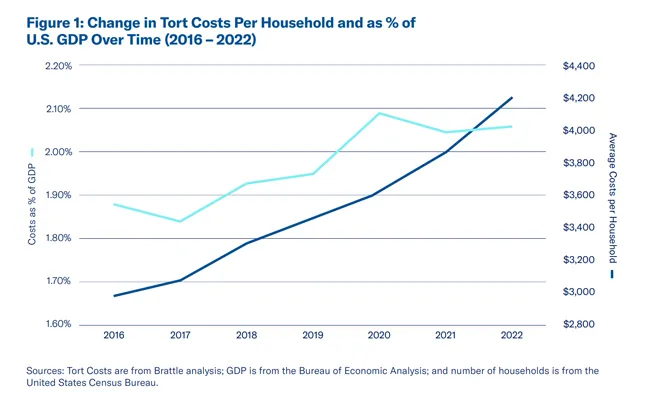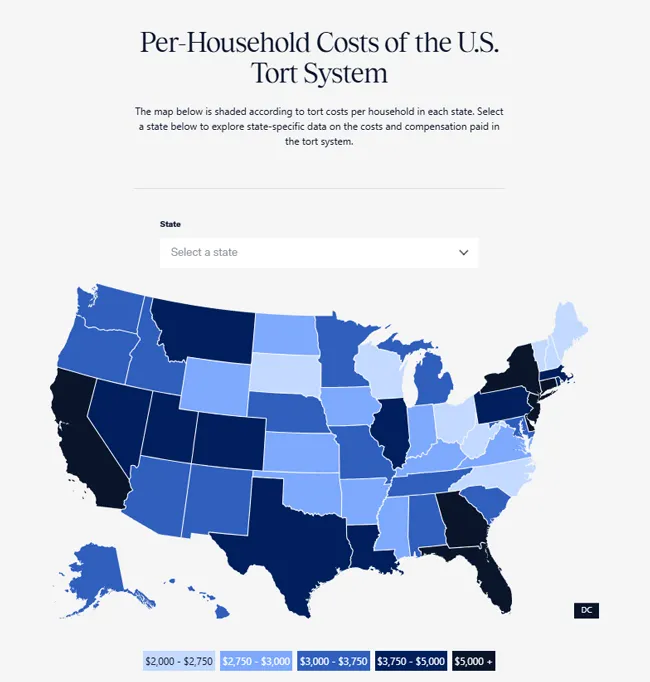Staff Reporter
States Acting to Curb Nuclear Verdicts Across US

[Stay on top of transportation news: Get TTNews in your inbox.]
State lawmakers are taking wider aim at lawsuit abuse, working to curtail an issue that for years has vexed the trucking industry and which now is drawing more mainstream legislative attention due to the thousands of dollars per year it is estimated to cost average Americans.
Per the U.S. Chamber of Commerce, frivolous lawsuits are estimated to cost the average U.S. household more than $4,000 per year, as measured in tort costs incurred by each state.
The Chamber’s Institute for Legal Reform put costs and compensation in the U.S. tort system at $529 billion in 2022, equal to 2.1% of GDP and averaging $4,207 per household. The per-household costs per state vary and consist of total court costs paid in individual states, and the figures include general and commercial litigation liabilities (such as personal injury claims), automobile accident claims and medical liability claims. The findings come from the Chamber’s recently updated analysis, “The Hidden Costs of Lawsuits Continue to Grow.”
“The average annual tort cost growth rate has reached 7.1% since we began measuring in 2016, and that figure rises to 8.7% when looking only at cases involving businesses. If current trends continue, the costs of lawsuits will continue to skyrocket, with overall tort costs rising to over $900 billion by 2030,” the Chamber noted.

It described lawsuit abuse as including deceptive advertising and third-party investors who cover costs of a lawsuit for a return on their investment, especially in high financial settlements.
“This exploitation turns a system meant to compensate injured parties into a tool for personal gain, often at the expense of not just defendants but those it was designed to protect as well,” the Chamber stated.

Louisiana, Georgia and Wisconsin are expected this year to introduce bills targeting lawsuit abuse, following other states — including Arizona, Florida, Texas and others — that have taken legislative aim at the issue.
In Wisconsin, Gov. Tony Evers vetoed a bill that legislators approved. It would have placed a $1 million cap on noneconomic damages that can be recovered from a commercial motor vehicle carrier from a court claim involving injury, death or other loss to a person in cases resulting from an act/omission by an employee of the commercial motor vehicle carrier while acting within the scope of employment. "The trucking, insurance, and business communities intend to work on this legislation again in 2025," said John Cronin, associate director of government and regulatory affairs at Sentry Insurance in Madison, Wisc.
David Bauer, American Trucking Associations’ vice president of state and tax policy, said ATA and its state associations have worked since 2019 to educate lawmakers and advance legislative efforts to outlaw predatory lawsuits, especially those targeting trucking companies. ATA maintains a Lawsuit Abuse Resource Hub online with information on the problem and tips for state legislative efforts.
The federation notes that rising and disproportionate verdicts are negatively impacting the trucking industry and driving up costs ultimately paid by consumers. “For a motor carrier who receives a nuclear verdict, generally defined as an eight- or nine-figure verdict, it could mean bankruptcy. But it always means increased supply chain costs,” ATA stated.

Bauer
Bauer explained, “We really hadn’t experienced the targeted nature of some of these lawsuits. You always hear about nuclear verdicts and staged accidents where folks create a collision for the benefit of a crooked doctor or a crooked lawyer — or somebody dumb enough to run into a Class 8 vehicle — to get a quick insurance settlement. All of that has motivated us at ATA and throughout our four years here to realize that change needed to occur proactively on the state level. There’s a lot to be proud of so far. We come off a very successful year.”
Details on new laws tackling predatory litigation that were enacted in Indiana and West Virginia are as follows:
- In Indiana, evidence can now be introduced in civil suits about a passenger failing to comply with seat belt restraint system laws, a move to mitigate damages for personal injuries or death experienced by a plaintiff. The law applies to individuals who were at least 15 years old when an incident happened, and were inside a motor vehicle made after Sept. 1, 1986, that was equipped with at least one inflatable restraint system.
- In West Virginia, noneconomic damage awards can no longer be higher than $5 million in civil lawsuits involving personal injury or wrongful death claims against commercial motor vehicles.
Landmark tort reform legislation also swept through Florida, Iowa and Montana in 2023:
- In Florida, reform efforts set prohibitions on predatory legal behaviors that included a modified comparative negligence definition and elimination of one-way attorney fees and fee multipliers. The state also lowered its statute of limitations on filing certain lawsuits from four years to two years. The state said that Floridians cannot be held liable for damages if the person who files a lawsuit is found to be more at fault in the incident. Florida also specifically outlawed the introduction of fictitious and inflated medical bills at trial.
- In Iowa, maximum jury awards are now limited to $5 million in accident lawsuits against commercial vehicles. Also, trucking companies are protected against charges of negligent hiring of a driver.
- In Montana, third-party investors who finance civil litigation must now register with Montana’s secretary of state. Also, usury fees are banned and terms of lawsuit financing agreements and right to cancellation must be disclosed. Additionally, opposing sides in litigation can access third-party contracts without filing legal discovery motions for documents.
In 2025, Bauer expects to see more interest from state legislators on third-party litigation and financing.
“Only 15 states regulate it,” he noted. “They make it a disclosure by the plaintiff that this lawsuit is being funded by a hedge fund or investment firm. We feel that’s the approach that needs to happen in all 50 states. This is a discoverable topic; a fact finder should know about. I think you’ll see a number of states pursue that.”
RELATED: Cases Pour In Before New Florida Lawsuit Abuse Law Takes Effect
Bauer stressed that juries and judges should know when a third-party investor has a stake in a civil lawsuit seeking damages, and defendants should be able to bring those facts to a jury’s attention.
“When you start inserting a third party between the plaintiff and the actual litigator that’s going to try the case or handle the matter for the injured party, who is that litigant or lawyer listening to? Is it the hedge fund firm that he has now borrowed $100,000 to fund the lawsuit, or is he listening to his client? We certainly see an interest where settlement offers that would be presented to a client are not even communicated because of the concern that the hedge fund or the litigation financier needs to be repaid, or needs a bigger settlement,” he commented.
In 2025, Bauer also expects lawsuit abuse legislation to be reintroduced in Louisiana after Gov. Jeff Landry in 2024 vetoed a bill.

Amar
Renee Amar, executive director of the Louisiana Motor Transport Association, said state lawmakers have been meeting monthly on the issue since the last legislature adjourned in June.
“Their focus has been and remains on fully understanding why Louisiana has the highest auto rates in the nation,” she said. “They are also studying all of the major areas in the civil justice system where we are an outlier. They are compiling that information, which will culminate in a joint committee meeting in January to discuss their findings. From those findings, they will craft solutions targeting those issues.”
She noted that the trucking industry is involved in the discussions.
“The truckers have been actively involved in nearly every one of the committee hearings, ensuring that the lawmakers remember that this isn’t just a battle between the mammoth trial bar and mammoth insurance companies,” she said. “But we are the people squeezed in the middle being devastated by these record high insurance rates.”
Still uncertain is the type of legislation that might be introduced, including whether it would duplicate the 2024 measure vetoed by Landry or split into multiple bills.
Amid these efforts, the American Tort Reform Foundation in its annual “Judicial Hellholes” report — which ranks the Top 10 worst states for lawsuit abuse — illustrated that the issue spans the country. The Top 10 were:
- Pennsylvania
- New York
- South Carolina
- Georgia
- California
- Illinois
- St. Louis, Missouri
- Michigan
- King County (Seattle area), Washington
- Louisiana
The Dec. 10 report noted that Pennsylvania earned the dubious top rank by virtue of nuclear verdicts costing state residents $1,431 annually. New York’s second-place finish was earned by the prevalence of so-called “fraudemic” legal schemes that target businesses perceived to have deep pockets for payouts. The report said that commercial vehicle and construction site accidents in New York were the main targets for “organized crime rings, unethical lawyers, and corrupt medical providers who exploit legal loopholes to orchestrate elaborate scams.”
Experts from Sailun Tires dive into strategies for managing tire expenses amid a challenging freight market. Tune in above or by going to RoadSigns.ttnews.com.
The report said, “In some instances, the scammers have gone so far as to encourage individuals to undergo unnecessary, painful and expensive surgeries — all to increase potential insurance payouts. The scams often target workers born outside the U.S. with limited English proficiency, leaving them vulnerable to exploitation and sometimes in debt to predatory lenders.”
South Carolina came in third place for asbestos litigation. Georgia followed as No. 4 due to the prevalence of nuclear verdicts. There, what the foundation dubbed “lawsuit lottery” is costing each household in the state $1,372 yearly.
ATRF linked the rise in nuclear verdicts in Georgia to inflated medical awards, propelled by a law which prohibits disclosure of whether a seat belt was worn by passengers in vehicle accident cases.
The foundation described Georgia as becoming a “lawsuit lottery” state. “Georgia’s courts are sending a dangerous message: come to our state, where even the smallest incident can lead to a million-dollar payout,” it said.
Want more news? Listen to today's daily briefing above or go here for more info
ATA’s Bauer hopes to see lawsuit abuse legislation introduced in Georgia in 2025.
“We have a great relationship with Gov. Brian Kemp, who has pledged that this will be at the top of his legislative agenda,” he said. “We’re going to work with him shoulder-to-shoulder if that’s what they pursue.”
Louisiana earned its 10th place spot for issues spanning nuclear verdicts to insurance fraud. “Recent data reveals the stark economic consequences — Louisiana loses 40,500 jobs each year due to excessive tort costs while residents pay a $965 annual ‘tort tax,’ ” ATRF declared.
The foundation said the trucking, pharmaceutical and oil and gas industries are prime targets, with state courts awarding about $409 million in nuclear verdicts across these sectors in 2023.





